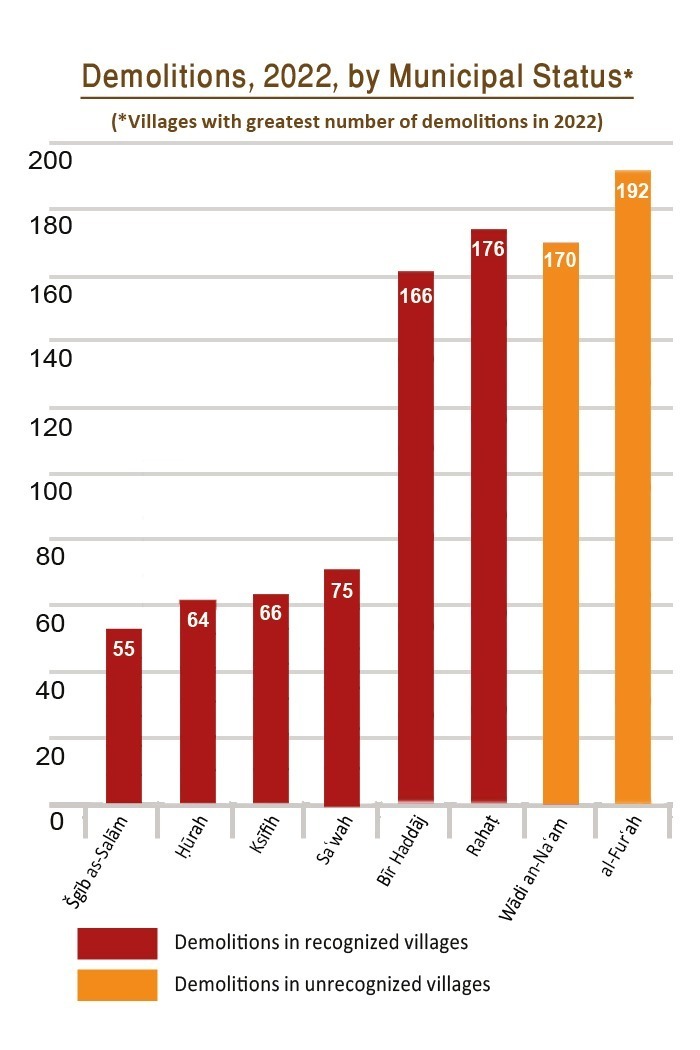
Negev Coexistence Forum for Civil Equality
פורום דו-קיום בנגב לשוויון אזרחי
منتدى التعايش السلمي في النقب من أجل المساواة المدنية
Haia Noach – Shmulik Daviv/The increasing home demolitions in the Negev – an open wound in a bleeding community
The demonstration that took place on March 9th at the government compound and at the courthouse in Beer Sheva was a first sign of shift in the Bedouin community’s position. Hundreds of the Negev’s Bedouin residents protested angrily against the new Government’s policy which increases the rate of home demolitions and initiates more and more violent police actions that are often provocative and outrageously timed.
While the Government continues to refuse to promote the recognition of more than 30 Bedouin communities, the coalition agreement sets a precedent in committing to allocate 1.6 billion NIS for the accelerated establishment of 14 new Jewish communities in the Negev during the next two years. This is part of a large wave of planned efforts to strengthen settlement in the area. The heads of the coalition openly declared that the goal of the settlement wave is to ensure Jewish dominance of the land and the “demographic balance.” This too, was formally and explicitly enshrined in clauses of the coalition agreement
15,000structures were demolished in 6 years
The shift in the community’s position is mainly a result of the new wave of house demolitions that is evident on the ground. NCF’s data show that approximately 15,000 structures were demolished in the last six years. This is an unbearable number that exposes a violent policy aimed at forcibly concentrating most of the residents of the unrecognized villages in neighborhoods that are totally lacking the infrastructures that the Bedouin Displacement Authority is building in the recognized villages.
Jewish society does not understand the extent of the harm caused to the Bedouin community by the demolitions. The administration is unaware of the anxiety and depression they cultivate and the sense of existential insecurity they cause, similar to the harm caused to the residents of the Gaza Envelope as the result of rocket attacks. Numerous studies indicate mental harm, but the government refuses to draw conclusions. In a survey conducted among Bedouin youths and teenagers, it was found that they believe that house demolitions are the third most important cause of crime among the community. For years, organizations that operate in the Negev have been requesting to allocate hours of mental health assistance to the affected families and children. Despite the surveys and pleas, government ministries choose to ignore the distress. House demolitions are, therefore, an open wound in a bleeding community.
In the last year alone (2022), 2850 structures were demolished in the Bedouin communities. During the previous year (2021), there were 5% more demolitions. The decrease in 2022 seemed to reflect a modest achievement of the “government of change.” Some of the members of that government had good intentions, but in fact, the windmills of injustice continued to work at the same pace as before. Law enforcement officials persisted in the destruction, proving once again that good intentions can lead to hell.
Reports from the Southern Administration for the Coordination of Enforcement of Land Laws show that the scope of demolition operations decreased in 2022 primarily because police from the Yoav unit, whose main mission is to escort the demolition units, were directed to other policing operations. In addition, security restrictions on movement in the area were imposed as a result of the fight against afforestation and during the Passover and Ramadan holidays. There was also some decline in requests by the Bedouin Settlement Authority to receive judicial orders.
“A National Campaign to Eradicate Nationalist Crime”
In the current government, the good intentions vanished as if they never existed. Aggressive enforcement and racial declarations have replaced them. The coalition agreements include statements of intention “to establish a comprehensive national campaign to restore personal security to the citizens of Israel, to eradicate nationalist crime and to develop contingency plans to deal with the opening of an internal front during an emergency.” Special emphasis was put on the “battle over open spaces” and “preservation of national lands.” Promises to wage war against nationalist bullying, illegal weapons, agricultural terrorism, and protection money, amongst others, by setting minimum penalties by law.
Moreover, the coalition agreement stipulates an intention to change the open-fire regulations and to ensure immunity from prosecution for soldiers and police officers who violate the law “unmaliciously” during operational activity. It also declared the intention to implement the “Dromi law,” which allows the shooting of anyone who breaks into an army camp, training grounds, and even car thieves. Lastly, the agreement stipulates a commitment to combat the phenomenon of polygamy, reflecting an emphasis on offenses that are prevalent primarily among the Bedouins in the Negev.
At the beginning of his term, the Israeli National Security Minister, Ben Gvir, declared a plan to add 4000 police officers to the police force and to double the Border Guard. An announcement was made about establishing a national task force, a SWAT unit against organized crime, and a “National Guard” with ten thousand fighters. It was also declared that a joint team of the police, Ministry of Justice, and the General Security Forces (GSF, “Shabak”) will be established that will discuss the possibilities for GSF to join operations against crime organizations in Arab society. It appears that this joint unit is intended to work to establish a dedicated unit within the GSF to combat “nationalist crime and criminal organizations.”
The Arab community in the Negev has a clear interest in increasing the fight against crime. The crime wave in the community in 2022 reached a painful record: 16 Bedouin citizens were murdered, all by their fellow Bedouins. This, is compared to 10 cases in 2021 and 10 in 2020. Shootings, domestic violence, and violent brawls between clans assail the community on a daily basis.
While the former Minister, Omer Bar-Lev, and his Deputy Yoav Segalovitz conveyed concern for the needs of the Arab society and aspiration for true partnership, Ben Gvir sends out opposite messages. A survey carried out in 2021 showed that Bedouin youth have a conspicuous lack of trust in the police’s intentions. Ben Gvir’s statements have only deepened the reluctance to cooperate with the police.
“No more cosmetic actions”
A major change in the Minister’s policy is directed towards the Negev. Ben Gvir had an extended visit in the area and declared: “No more cosmetic actions of demolishing tin shacks for PR purposes. No more tacit consent to a hostile takeover of State land. We are moving from a policy of containment and stalling so as not to violate the status quo to a policy of determined action and law enforcement”.
During his visit to the Negev, Ben Gvir stated that he demands that the police “look criminals in the eye and strive for contact.” Further, he announced defiantly that contrary to the past, demolitions will also continue during the Ramadan: “There was a concept here that during the Ramadan, everyone must duck and cover. No law enforcement; they can build as much as they want and throw Molotov cocktails. That will not happen on my watch.”
Indeed, in the last few months, house demolitions have accelerated. According to data from the Israel Land Authority, in February 2023, 450 warnings before eviction and demolition orders for structures were distributed. The record was on February 22nd when seven houses of the Al’ul family in the village Araara were demolished as well as a hospitality structure (Sig). The residents testified that the buildings were built a long time ago: some of them were built in the 80s and some in the beginning of 2000. The explanations did not prevent the police from employing 150 policemen in an operation to demolish the houses. As a result, approximately 80 people were forced to dwell in tents. Family members were caught by surprise since there was no distribution of orders or summonses to the court prior to the demolition. The explanation that was given by the police in court was that the residents in the compound are unknown to the authorities, “anonymous people”, in spite of the fact that the family has resided in the same spot for about 100 years.
At the beginning of 2023, it became known that the enforcement authorities replaced the advanced “Simplex” system that analyzes pictures with a more advanced system called “Netz Hadarom” developed by the Weapons Development Authority. The new system is based on AI and can scan about one million Dunham and quickly decipher aerial images. This enables the identification of large numbers of structures immediately, from a “drone’s-eye view.” Identifying construction close to its execution facilitates accelerated and relatively simple legal treatment, with no need for court intervention.
Supposedly, the demolition effort is directed mainly toward new construction. However, when new structures are not identified, the inspectors identify old structures that went through changes, such as a roof that collapsed and was repaired or a window that was replaced, and enforcement officials then seek to demolish them on the pretext that they are “new construction”
In some villages, more than a hundred structures were demolished in 2022
The wave of demolitions last year is still felt in the Bedouin community: in some villages, over 100 structures were demolished in 2022 alone. A record number of demolitions occurred in the village of al-Furʿah, a village that in 2006 received Governmental approval for its planning before recognition and even had an impressive master plan prepared. However, in 2010 everything was put on hold due to possible phosphate mining in nearby Sde Brir, a plan that has not never, to this day, been prepared. In other words, the economic interests of one single family, the Ofer family, were more important than the needs and rights of 12,000 residents who continued to live in tin shacks and block houses. During 2022, 192 structures were demolished in al-Furʿah. For over a decade life in this village has been continuing in limbo, under the shadow of the planning freeze and continuous demolitions.
A second record number of demolitions was recorded in the village Wādi an-Naʿam. This village is supposedly recognized with approved plans, but these plans are only on paper. In practice, their implementation is frozen because the planning was carried out rigidly, ignoring the needs of about 12,000 residents. In this village alone, 170 structures were demolished in 2022
The third record number was recorded in the recognized village Bīr Haddāj. The village was formally recognized in 2003 but to this day, the state refuses to reach an understanding with the residents about practical solutions for its planning, and about 9,000 residents are paying the price. Within the jurisdiction borders of the village, 57 demolitions were recorded in one year. In the area adjacent to the village, an additional 109 structures were demolished.
Widespread destruction also in other recognized townships
The other recognized communities also continue to suffer waves of destruction. In the region of the city of Rahaṭ, 176 structures were demolished (130 of them within the city limits) in 2022, in Saʿwah 75 structures, in Ḥūrah 64, in Bīr Haddāj 57 and in Šgīb as-Salām 55 structures.
The Director General of the Bedouin Settlement Authority, Yair Maayan, recently admitted to the Knesset committee for “Strengthening the Negev and Galilee” that 50,000 Bedouins who live in recognized communities live in fact in unregulated neighborhoods with no infrastructures. This is a huge failure of the State and the Authority he is heading to. Maayan boasted during the discussion that the Authority planned housing for 165,000 Bedouin families. According to him, there are 70,000 housing units under development. “This is much more than the Housing Ministry and Israel Land Authority combined are planning for all the Arab communities”.
Maayan’s declarations are spectacular, but in fact, it all remains on paper. The construction is progressing in very small numbers, insignificant compared to the needs of a community where tens of thousands of babies are born yearly. In order to identify the gap between the number of structures in planning and the actual supply of housing, it is worth comparing the extent of demolitions and the extent of construction. In 2021 in Ḥūrah, 122 building permits were issued while 64 constructions were demolished. In Šgīb as-Salām 34 building permits were issued in 2021, while 55 constructions were demolished in 2022. In the last 20 years, only five building permits were issued in Bīr Haddāj, simply nothing, and even then, not all are for dwellings. And as already said, in 2022 alone, 57 structures were demolished within the jurisdiction of the village, and another 109 structures in the adjacent area. Over the years, hundreds of structures were demolished in the village of Bīr Haddāj.
Disproportionate destruction that does not produce change
The government is implementing selective enforcement and excessive police power. This indicates intentions toward violent repression rather than progress toward a solution for the benefit of the residents. The government is demolishing on an enormous scale and, at the same time, is not building on the scale necessary to provide housing solutions to the expanding community. The massive investment in police escort for the execution of demolitions is at the expense of effective policing and crime prevention in other contexts.
And, of course, in spite of the demolition efforts, in the absence of available housing and solutions for regulating housing in the unrecognized villages, illegal construction is only expanding. According to data from the Israel Land Authority, there has been an increase of 43% in illegal construction in the Negev in the last two years.



 Youtube
Youtube
 Twitter
Twitter
 Facebook
Facebook